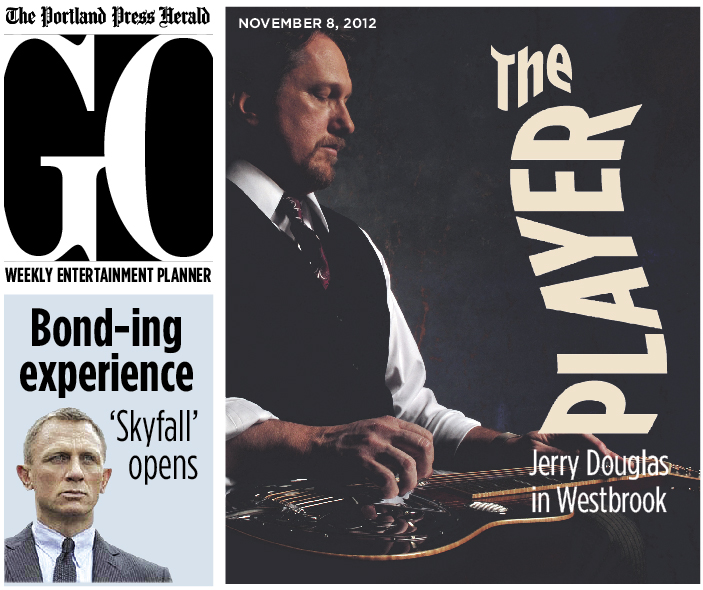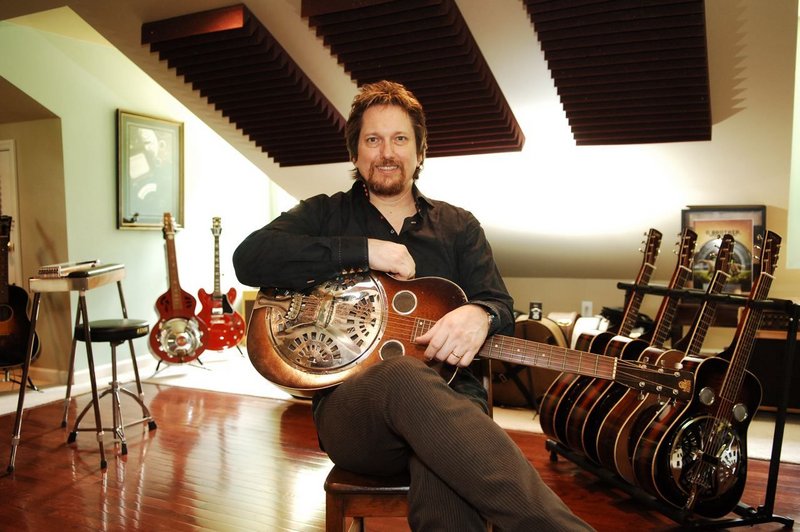When Mumford & Sons — one of the hottest acts in music right now — began to play large music festivals in the U.S., it sought out Jerry Douglas.
At first glance, this would be one of the oddest of musical pairings. The guys in Mumford are British and in their 20s. Douglas is an Ohio-born son of a guitar-playing steel worker who has been a sought-after bluegrass, country and rock session musician since the mid-1970s. He’s best known for his skill with a dobro, a style of resonator guitar.
But the members of Mumford & Sons are also passionate about bringing attention to acoustic and traditional folk elements in music, as is Douglas.
And so far, Mumford & Sons has been gaining fans and drawing attention to the ideas of traditional folk music without rigidly copying old songs or styles. That’s something Douglas is also very much in favor of.
In fact, when Mumford member Winston Marshall told Douglas he wanted to take five-string banjo lessons, Douglas told him not to.
“I told him if he did that, he might sound like everyone else, and the band would lose an important part of their sound,” said Douglas, 56, from his home in Nashville. “If you’re just worried about how technically well you can play your instruments, about your chops, then you’ll be playing to a room full of musicians every night. The music has to evolve, so it’s not about copying somebody else’s style.”
Douglas, who’ll bring his band to the Westbrook Performing Arts Center on Saturday, is certainly not a copycat.
He’s fashioned a nearly 40-year music career that defies easy categorization. At 17, he was a member of the progressive bluegrass band The Country Gentlemen, and soon was playing with the likes of Ricky Skaggs and Tony Rice.
He recorded his first solo album, “Fluxology” in 1979, and has alternated between his own material (both solo and with various bands) and session gigs ever since.
Dougas has recorded with everyone from Ray Charles, Johnny Mathis and Paul Simon to Elvis Costello, Assembly of Dust and Phish. He has won more than a dozen Grammys as a solo artist, as part of Alison Krauss and Union Station (of which he’s still a member) and for various other recordings.
His latest solo album, “Traveler,” came out in June and went quickly to No. 1 on the bluegrass charts. After playing as a session musician on other people’s records for years, Douglas attracted an impressive cast of supporting players for “Traveler,” including Eric Clapton, Paul Simon, Keb’ Mo’, Marc Cohn, Bela Fleck and, yes, Mumford & Sons.
Douglas thinks the huge popularity of his young friends in Mumford & Sons is a reminder that musical tastes are very cyclical. He thinks Mumford is doing for roots and folk music what the soundtrack to the film “O Brother, Where Art Thou?” (on which he played) did about a dozen years ago.
“Music is cyclical, and the cycle always starts with roots music,” he said. “At some point, people want to go back to the roots, but then the music becomes popular and over-produced and nobody wants to hear it anymore.
“Then a natural disaster or something happens, and everyone wants something simple again. It gives everyone strength to hear that kind of music done well.”
Douglas met Mumford & Sons about three or four years ago, when they asked him to perform with them at the Telluride Bluegrass Festival in Colorado. At that time, the Mumford members weren’t even old enough to rent a car in this country. Hanging out and getting to know them was fun, he said — sort of like hanging out with his own children, who range in age from 20 to 30.
Douglas knows first-hand the influence an older musician can have on a younger one. In his case it was his father, a guitar player from West Virginia who moved to the Youngstown, Ohio, area to work in the steel mills.
Although he worked in the mill by day, Douglas’ father had a fairly successful band by night and on weekends. The house was always filled with old country and bluegrass music.
“He wouldn’t let me play his guitar, so he got me one from Sears. But by the time I was 10 or so, I was playing the dobro,” said Douglas.
Douglas saw many country music stars of the day — Loretta Lynn, Ernest Tubb, George Jones — who played near his home. He also listened to rock stations out of Cleveland, and says he’s glad he has a variety of musical styles in his background. It’s certainly helped him with all the different styles of music he’s played as a session musician over they years.
“I’m glad I have the bluegrass background, because it’s a very physical music with a lot of improvisation,” said Douglas. “So it’s easier to go from bluegrass into rock than the other way around.”
As soon as he graduated high school, Douglas left home to play in other people’s bands — first in Washington, D.C., then in Kentucky, and finally, in Nashville.
He sometimes regrets about not having a college education. But he realizes the road he’s followed was the right one for him.
“I knew I was a good enough musician to do this,” he said, “and I just followed my gut on every musical move I’ve made.”
Staff Writer Ray Routhier can be contacted at 791-6454 or at:
rrouthier@pressherald.com
Twitter: RayRouthier
Send questions/comments to the editors.




